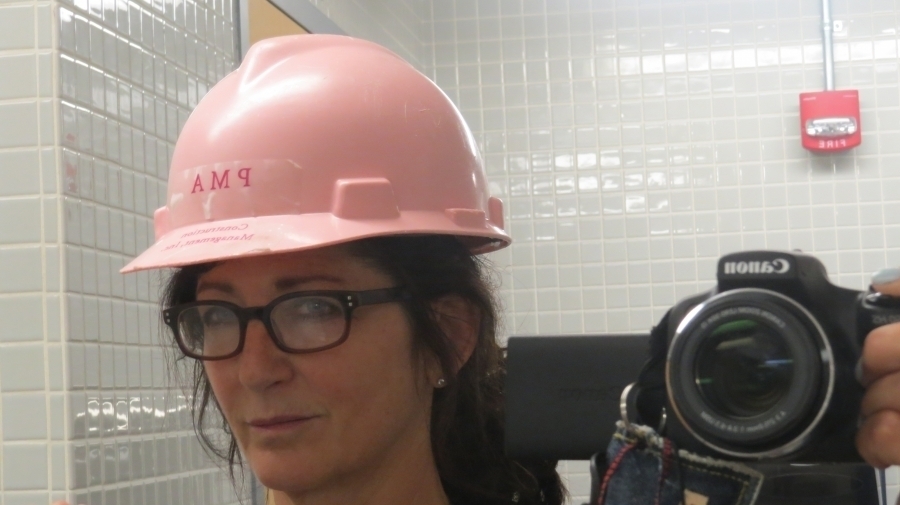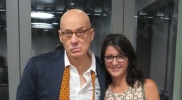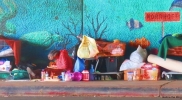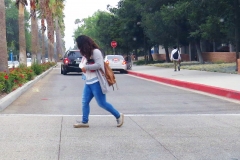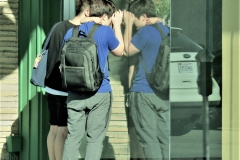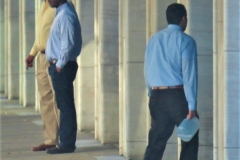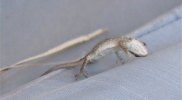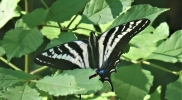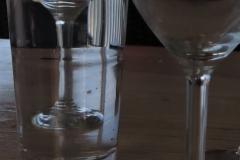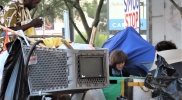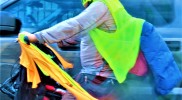|
|
Best Trivia - Science
|
Favorite Trivia – SCIENCE & TECHNOLOGY & ENVIRONMENT
|
| “There are two marine creatures that I have always identified with.
One of them is the juvenile sea squirt. This is a little thing that wanders through the sea looking for a nice rock or hunk of coral to make its home for life. When it finds the right spot and takes root, it no longer has any use for its brain. So it eats it…
By the way, the other marine creature is the hagfish. It is a jawless thing that, when attacked, secretes enough slime to cover itself and repel the predator.” [February 24, 1997]
Jim Holt
|
| “Computers are useless. They can only give you answers.”
Pablo Picasso
|
| Colorblindness:
Men: 1 in 12; Women: 1 in 200 [according to a report in Parade, Oct 21, 2018].
Men are more prone because the colorblind gene is found in the X chromosome and men have only one X chromosome (and one Y chromosome); women have two X chromosomes. This doesn’t make sense on the surface, as one would think that women have two times the chance of having a colorblind gene since they have two X chromosomes, but this is not the case because a woman has to have the colorblind gene in BOTH of her X chromosomes to be colorblind.
The predominant colors that are difficult to distinguish are greens and reds. |
|
Higgs boson – (a.k.a., God’s particle) – In quantum physics, the quantum field that gives other particles their mass. It was detected in 2012 with the Large Hadron Collider. It is called God’s particle because it’s the physical proof of an invisible, universe-wide field that gave mass to all matter right after the Big Bang, forcing particles to coalesce into stars, planets, etc.
|
| “For nine months I grew a human being inside my belly and then pushed it out my vagina. Afterward I fed it with my boob. Biology is so fucking weird.”
Heather B. Armstrong – It Sucked and Then I Cried: How I Had a Baby, a Breakdown, and a Much Needed Margarita
|
| “…The founder of modern anatomy was Leonardo da Vinci: as a painter he was passionately concerned with the representation of the human body, and he longed for an exact knowledge of it. ‘For my part,’ he wrote, ‘I have dissected more than ten cadavers, in order to acquire a full, true knowledge of the human body.’ By the end of his life he had in fact dissected more than thirty, among them some of old men. He drew a great many old men’s bodies and faces; and from first-hand observation he also sketched their arteries and intestines.”
Simone de Beauvoir – The Coming of Age (trans. by Patrick O’Brian)
|
| “Einstein’s Brain: When Albert Einstein died in 1955, scientists wondered, ‘If we remove and examine his brain, will we discover any clues as to his unique genius?’ The meticulous photographing and dissection was conducted by Dr. Thomas Harvey, after which the brain… disappeared! Yes, really. Had Einstein’s brain escaped, perhaps in search of a new host body? No. It was found twenty-three years later, preserved in two mason jars, stored inside an old cider crate… at the home of Dr. Thomas Harvey. the mystery was solved, which was terrific for fans of science and really disappointing for fans of science fiction. To this day scientists are still studying the brain, which turns out to have an unusually thick corpus callosum. Also, it’s missing part of its Sylvian fissure, a condition that turns out to have been congenital and can’t be blamed on Dr. Harvey.”
Mo Rocca – Mobituaries: Great Lives Worth Reliving
|
| LANDLORD: “We need to talk about your incredibly high heating bills.”
TENANT: “Come by anytime; my door is always open.” |
| Where Is DNA Found?
Throughout the body – in cells…
Our bodies are formed from between 50 and 100 trillion cells (a trillion is a thousand billion, or a thousand, thousand million). These cells are organized into tissues, such as skin, muscle, and bone. Each cell contains all of the organism’s genetic instructions stored as DNA. However, each cell uses only the instructions from part of the DNA. For example, a muscle cell uses the DNA that specifies the muscle apparatus, whereas a nerve cell uses DNA that specifies the nervous system. It is as if each cell reads only that part of a book of instructions that it needs.
Within the cell – in chromosomes…
Each very long DNA molecule is tightly wound and packaged as a chromosome. Humans have two sets of 23 chromosomes in every cell, one set inherited from each parent. A human cell therefore contains 46 of these chromosomal DNA molecules.
Within each chromosome – in genes…
Each DNA molecule that forms a chromosome can be viewed as a set of shorter DNA sequences. These are the units of DNA function, called genes, each of which guides the production of one particular component of an organism. A set of human chromosomes contains one copy of each of the roughly 30,000 genes in the human “genome”—the term used to refer to the complete genetic instructions for an organism.
https://www.koshland-science-museum.org/sites/all/exhibits/exhibitdna/intro02.jsp
|
| “You can remember the taxonomic series of kingdom, phylum, class, order, family, genera, species with an appropriate mnemonic: Keep Pots Clean; Our Food Gets Spoiled.”
Sallie Tisdale – “The Sutra Of Maggots and Blowflies” (The Inevitable: Contemporary Writers Confront Death, ed. by David Shields and Bradford Morrow)
|
| “Eli asks if he can look up something about robots. I hand him my computer and go to the kitchen to make him some macaroni and cheese. When I come back, he is watching a video from a British morning show. It’s about a robot named Samantha. She is made to look like a human and has two settings, the inventor says. In sex mode, she can moan if you touch her breast. In family mode, she can tell jokes or talk about philosophy.”
Weather – Jenny Offill
|
|
“When I was young, I learned about the selfish gene. Lying in bed at night, cuddled beneath the covers, my dad’s voice would soothe me to sleep with talk about the complexity of the human genome, the spiral shape of a DNA helix, the way forces of natural selection would make harmful mutations die out with the host, but allow random beneficial mutations to proliferate and spread through a population…
“Every night, as he’d wax poetic about the marvels of evolutionary biology, I’d fall asleep to the letters A, T, C, and G, amazed at this world we live in, developing this profound love for the theory of evolution, for the belief that random chance and probability could shape a planet…
“Evolution seemed like a religion, but it wasn’t one because it does not require faith, it encourages you to question, to dig, literally, to understand the origin of our species and the complex history of the genetic matter that existed, mutated, and evolved to construct this current world of ours…
“I was born with two defective copies of the CFTR gene (cystic fibrosis transmembrane conductance regulator gene), one mutated copy from each parent. You have one copy of the gene, and you get a heterozygote advantage, an increased fitness because of a lower likelihood of dying of cholera. But with two copies of the gene, you’re salty. The old adage goes, ‘The child will soon die whose brow tastes salty when kissed.’…
“Staying alive, for someone with CF, requires active and constant effort against natural selection, requires a grand fuck you to that force which, left to its own devices, would have us suffocated from respiratory failure before adolescence. What does my survival come down to, what is responsible for my ability to trump natural selection? Medicine. Medicine gives me the gift of life…
“How is that fair? Why do we, today, get to override evolution? What will that do for the future of our species? More important, what does that mean for the millions of other species on this planet who don’t have that unfair advantage, who still exist at evolution’s mercy?” [October 16, 2014]
Salt In My Soul: An Unfinished Life – Mallory Smith
|
| “Why contraction? It is less a spasm and more an opening. The tiny porthole of the vagina expands to ten times it normal size during delivery; the pinpoint of the cervix widens enough for a fist, and then a head… Relaxin, one of the least understood chemicals in the female body. It is a hormone… but unlike estrogen and progesterone, which circulate in the blood all through the female life cycle, Relaxin is purely pregnancy specific. It has a lovely name: Re-lax-in, like a yawn, like a hammock on a day in mid-July. Indeed, Relaxin is a loosener, a tissue softener, its subtle, continuous pulses from the third trimester on causing the collagen fibers in the cervix to thin and expand, causing the flesh of the vaginal walls to give up their tone so they can stretch like a piece of pink spandex…
“Without Relaxin, birth would not be possible… By the twenty-sixth week of pregnancy, assuming Relaxin levels are normal, your uterus and cervix are the antithesis of rigid; they are marvelous, silky, milky textiles, outrageous stretchy satin in deep merlot colors; you are young again. This is a literal as well as a figurative truth. Relaxin as an elixir is being investigated by the cosmetic companies to give the face and breast that baby softness, that line-free look…”
Lauren Slater – Love Works Like This: Travels Through a Pregnant Year
|

Comments are closed.
|
|








